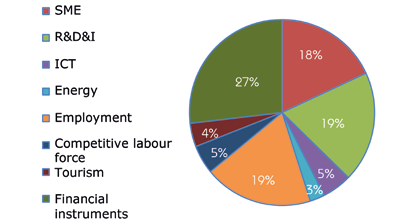In the EU’s 2014-2020 budget cycle, a total of EUR 25 billion has been allocated for Hungary, approximately 60 percent of which can be used directly for economic development, primarily through the Economic Development and Innovation Operational Programme (GINOP). In addition, corporations implementing large-scale investments and creating a sufficiently high number of jobs can also be eligible for aids financed from domestic sources, decided individually by the Hungarian Government (EKD).
Small and medium-sized enterprises (SMEs) with a staff of up to 250 are set to be the primary beneficiaries of EU-funded, partially non-refundable grants, except in areas (e.g., innovation, logistics) where large corporations are also likely to receive funding. Cash grants that can be awarded individually by government decision and the often associated corporate tax allowance can be seen as an advantage mostly by well-capitalised corporations.
An important rule for all investors is that the intensity of the so-called regional investment aid available for investment may not exceed the statutory limit. The figure below indicates the maximum aid intensities available for corporations in each region within Hungary:

Data presented in the figure are increased by 20 percentage points for micro and small enterprises, and by 10 percentage points for medium-sized enterprises. For instance, a large enterprise investing in South Transdanubia can be eligible for a maximum aid of 50 percent, whereas medium- and small-sized enterprises investing in the same region can be awarded, respectively, aids of 60 and 70 percent.
While in the previous budget cycle, for-profit organisations were typically awarded non-refundable grants, in the 2014-2020 period refundable funds are likely to play an increasingly important role: in addition to subsidised loans and the various guarantee programmes, a growing number of so-called combined schemes can be expected, which contain both refundable and non-refundable aids and can be awarded in the same tender.
As a positive change – and contrary to earlier practices -, effective as of 1 January 2015, enterprises with certified good standing having operated in Hungary for at least one full business year are not required to provide security (e.g. a bank guarantee).
Priority areas of the Economic Development and Innovation Operational Programms
EU funding earmarked for economic development will be available primarily through the Economic Development and Innovation Operational Programme (GINOP). With an overall budget of EUR 7.7 billion for a period of 7 years, the GINOP is principally intended to boost competitiveness through the development of small and medium-sized enterprises (particularly in the processing industry), improve employment and ensure continuous employee development in the following target areas:

Source: MAPI